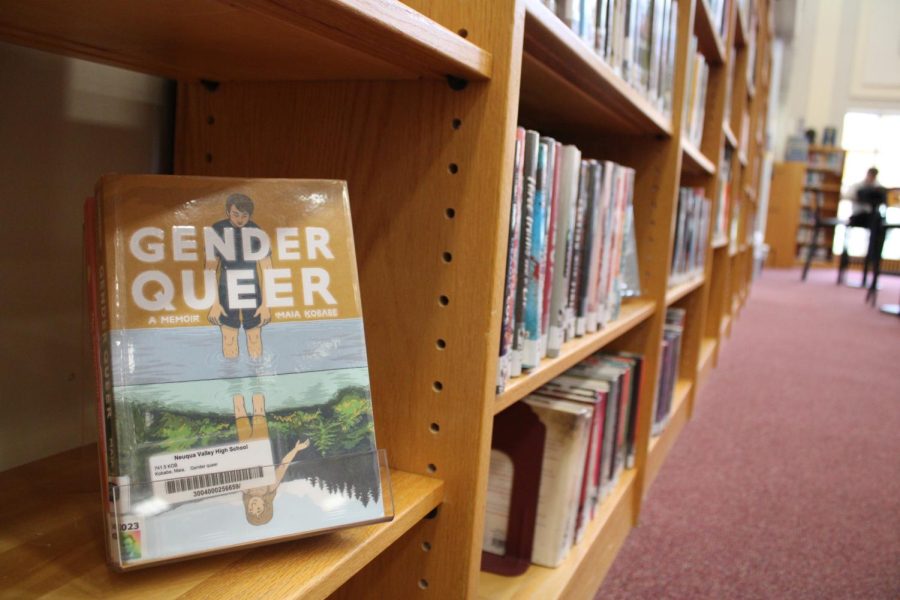Why you should care about book banning
One of the most discussed books, “Gender Queer”, in Neuqua Valley library
November 7, 2022
There is nothing like settling down on the couch and digging into a good book. While a fun or relaxing activity for some, others will only explore the world of literature through school. Most teens remember the mandatory reading into the dystopian world of Fahrenheit 451: the burning of books, and knowledge along with it. No one ever thinks it could become reality.
All across the country more and more books are being censored. Most of these bans are happening in republican controlled states, but, the numbers are going up. So far, 32 states and 138 school districts have bans on books with different themes. Many have noticed how states are specifically focusing on banning books that contain protagonist/secondary characters, themes, titles or highlight topics of LGBTQ+, sexual content, racism, activism, biographies and much more. According to PEN America, there have been at least 50 groups identified that are targeting censorship on hundreds of books.
Texas alone has 801 bans on all kinds of books, and as of right now, the highest amount of banned books in the USA. There are many different books being banned all over the country but listed below are some of the most popular ones.
“Gender Queer’ by: Maia Kobabe
“Me and Earl and the Dying Girl” by: Jesse Andrews
“The Hate you Give” by Angie Thomas
“The Diary of a Young Girl” by: Anne Frank
“To Kill a Mocking Bird” by: Harper Lee
“The Giver” by: Lois Lowry
Along with banning these books, some states are even banning children’s books. 19 percent of banned books are picture books. A large percentage of these children’s books are very popular. The banning of these books prevents children from learning about the harsh reality of humanity. Even though, some parents think their children shouldn’t hear about it, they really should. It’s not a bad thing for kids to be educated. Here are some of the most well known titles that are being banned or challenged.
“Drama” by: Raina Telgmeier
“The Adventures of Captain Underpants-series” by: Dav Pilkey
“The Giving Tree” by: Shel Silversten
“A Wrinkle in Time” by: Madeleine L’engle
As many of these titles are being removed from shelves in public libraries and schools, it is clear that the states are targeting the younger generations; With over 50 percent of the book bans impacting the growing minds of elementary-aged children and of passionate teenagers.
The continuous banning of books in schools in neighboring states can also place pressure on other states about what is best. The state of Illinois is no exception. In the last 9 months, there have been 4 book bans and restrictions at 3 schools, including discussions about the appropriateness of the book “Gender Queer.” As a growing movement, what’s to say Neuqua Valley High School won’t be impacted in the following years? When asked questions surrounding book banning, Neuqua Valley’s Library Director, Eric Bodwell, had his own opinions on the topic.
“I’ve probably been working in libraries for about 25 years and it’s always been a problem. If one group of parents or people says that one shouldn’t read this book, because they don’t think it follows their personal beliefs, then that can lead to all kinds of things,” he says. “There are certain standards for say when a librarian or teacher selects a book, they’re using professional judgment without any criteria. We do get questions from parents sometimes who are questioning those sorts of things and every district and public library has some kind of specific process to deal with that. You can get a vocal minority of people who are trying to kind of dictate what should happen for everyone. Professionally I don’t agree with that but I do think it’s their right to speak, but I think that they should go through a dual process.”
When asked about Neuqua Valley, Bodwell said “I know there’s been some talk in the community about certain books, but we haven’t been directly affected, except for people asking questions about certain books, but I do expect that at some point we will, have people either go to board meetings or I will get more phone calls and that’s perfectly fine, it’s people’s rights.”


